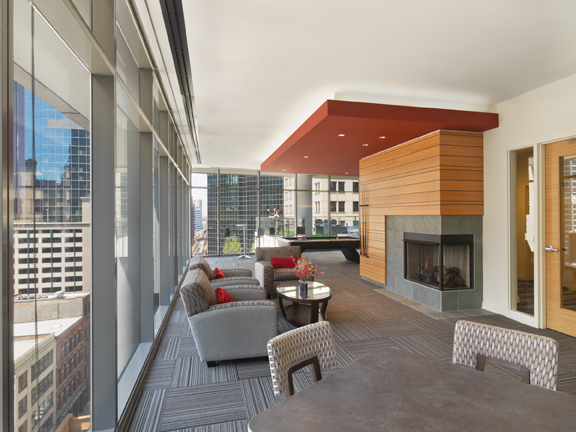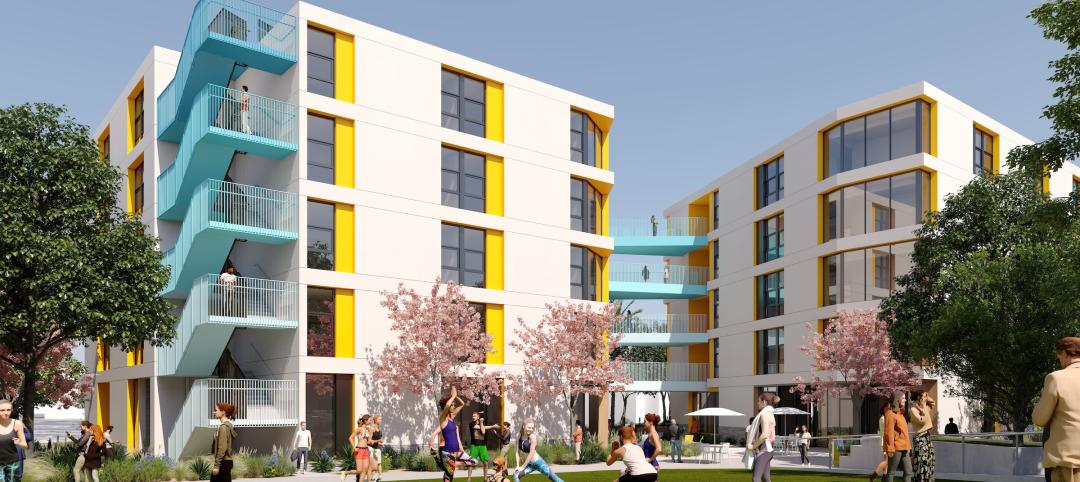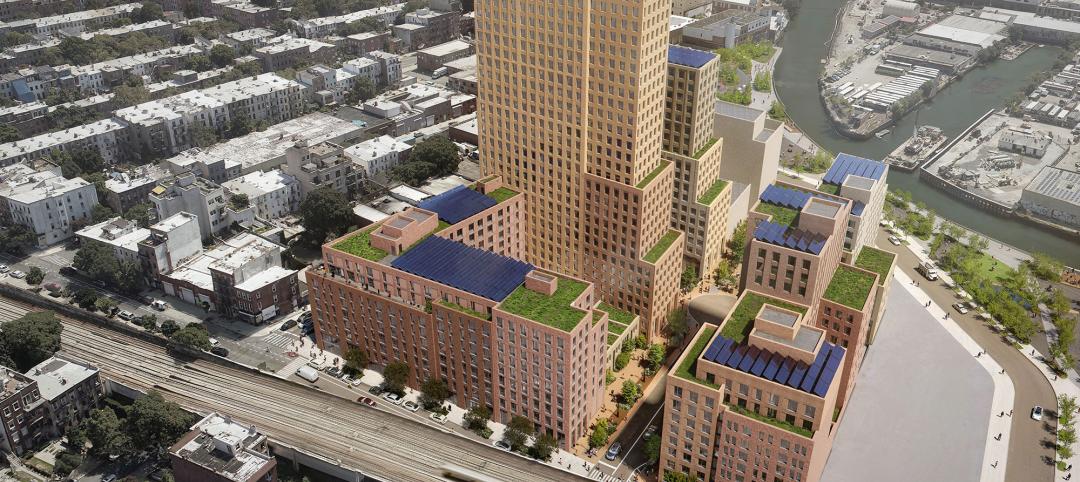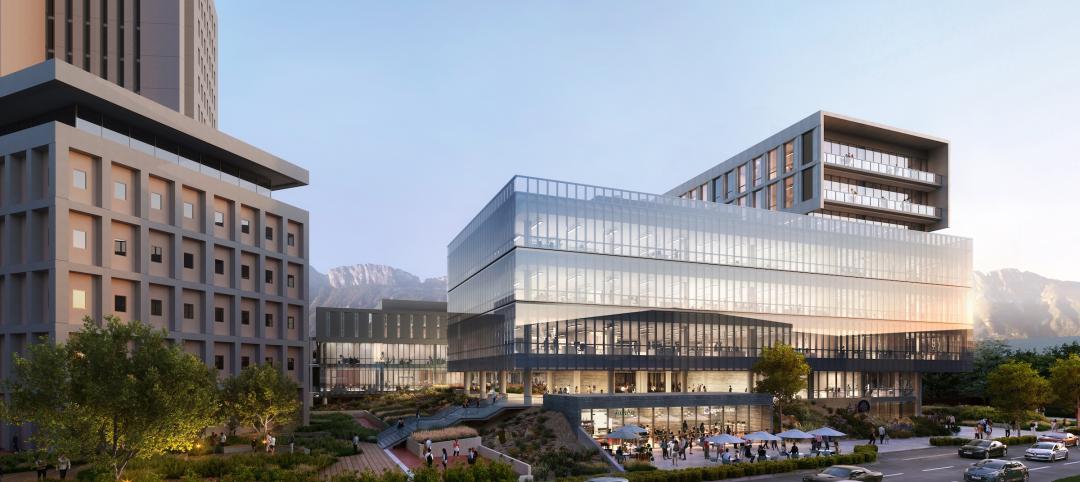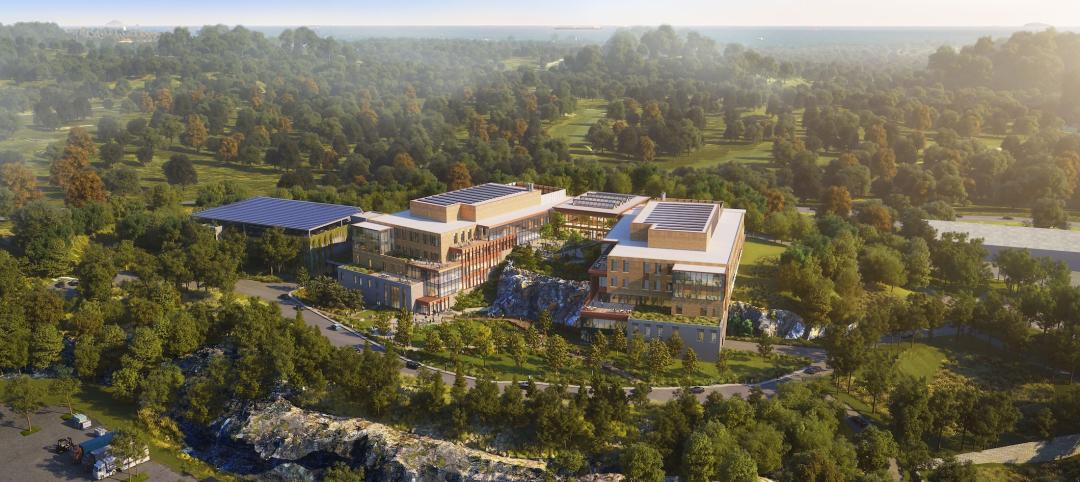Except for a few pockets of ultra-luxury condo action—New York, San Francisco, and parts of Florida, Hawaii, and metro Washington, D.C.—today’s multifamily story is all about rentals. “The apartment sector has been a darling for investors over the past two years,” notes the Urban Land Institute in its recent Real Estate Consensus Forecast. Vacancy rates are at an enticing 5.0%, and rental rates should be up 5.0% this year, although ULI does forecast some slippage next year, to 4.0%.
“Investors continue to view apartments as a preferred asset class in today’s environment,” says Dale Connor, Lend Lease’s Managing Director, Project Management & Construction, Americas. He sees developers playing catch-up to meet the growing demand for apartments, especially in the top five rental markets: New York City, Washington, D.C., Boston, Chicago, and Los Angeles.
SCROLL DOWN FOR GIANTS 300 MULTIFAMILY FIRM RANKINGS
Savvy market-rate developers are looking for locations around universities, innovation incubators, and teaching hospitals, says Ray Kimsey, AIA, LEED AP, President of Atlanta-based Niles Bolton Associates. Land that was once set aside for retail or office development is being looked at for multifamily, especially if served by urban transit.
“If you look at the hottest neighborhoods around Washington, D.C., Pittsburgh, or Baltimore, they all have an influx of Gen-Y people graduating and wanting to stay in that environment,” he says. Kimsey says there’s even a movement toward walk-up, garden-style apartments in some suburbs and second- and third-tier cities.
The use of urban infill sites is adding to the popularity of podium-style multifamily construction, says Mathew Dougherty, PE, Vice President with McShane Construction, Rosemont, Ill. “The podium ‘stacks’ uses vertically within the existing floor plate, thereby allowing a mixed format of ground-floor retail, parking floors, and residential floor plates,” he says.
According to John Lahey, AIA, Managing Principal at Chicago-based Solomon Cordwell Buenz Associates, the rental market is being shaped by two factors: service and community.
“Service” refers to the heightened demand for amenities: party rooms, surround-sound movie theaters, fully equipped fitness centers, mega-size video screens in common areas, computer golf games that let you play any course in the world, I-GO car rentals—even “restaurant days,” where a local restaurant comes in and sells takeout dinners one night a week.
There are even amenities for canine occupants. “People love their dogs,” says Lahey, so dog walks, dog parks, dog washing bays, and dog walking and grooming services are becoming de rigueur in many large (>400 units) complexes. “People want their lives to be easier,” he says. “They want to be taken care of.”
Tenants are demanding more green amenities, says Kimsey. “Expectations about energy conservation and sustainable features are now viewed as a basic right by many tenants,” he says. “If they lived in a LEED-certified residence hall in college they want a LEED apartment”—but not if it costs more than market rate.
“Community” refers to the renter’s need for connection, says Lahey. In past decades, apartment dwellers put a premium on privacy. Less so today. “A lot of people who move back into the city, they’re not confirmed urban dwellers, and they want to meet people,” he says. “The Starbucks in your building becomes the meeting place to get integrated into the larger community.” McShane’s Dougherty says wifi connectivity has become a given in new and renovated rental projects.
“The design must be hot,” says Kimsey. The units themselves may be “smaller, tighter,” but that means they must be more elegant and efficient, with open layouts and near-condo-like finishes. McShane’s Dougherty says granite countertops, stainless steel appliances, upgraded bathrooms, and high-quality flooring are expected, even in suburban garden apartments. Developers are increasingly concerned about sound attenuation, he says, so insulation choices, assembly details, and materials selection are crucial.
Looking ahead, SCB’s Lahey says that, unlike the condo market, apartment development needs to be left to the pros—firms like AMLI, Avalon Bay, Equity Residential, Forest City, The Habitat Company. “They have the track record, and they really do know what they’re doing,” he says.
“The money is out there,” says Kimsey, but it’s split between smaller projects being funded by S&Ls and smaller banks, and big projects attracting institutional and private-equity investors. Holding back the pent-up demand: anemic job creation, which limits new household formation.
Even with low mortgage rates, many potential buyers have become skittish about purchasing a home, says Lend Lease’s Connor. SCB’s Lahey cites mobility as another factor in rental’s favor, especially with the younger generation.
“People will like living closer in, and units will get bigger, something decent in size, and they’ll be willing to pay for it,” he says. “They’ll see a home as a place in which to live, not necessarily as an investment.” +
TOP 25 MULTIFAMILY SECTOR ARCHITECTURE FIRMS
| Rank | Company | 2011 Multifamily Sector Revenue ($) |
| 1 | IBI Group | 38,489,114 |
| 2 | Niles Bolton Associates | 13,772,650 |
| 3 | Solomon Cordwell Buenz | 12,000,000 |
| 4 | RTKL Associates | 11,397,556 |
| 5 | WDG Architecture | 9,817,297 |
| 6 | Perkins Eastman | 9,100,000 |
| 7 | HOK | 8,715,422 |
| 8 | Perkins+Will | 7,193,120 |
| 9 | ZGF Architects | 6,225,112 |
| 10 | Cooper Carry | 5,708,482 |
| 11 | Kohn Pedersen Fox Associates | 5,280,000 |
| 12 | Ziegler Cooper Architects | 4,853,598 |
| 13 | Harley Ellis Devereaux | 4,800,000 |
| 14 | PGAL | 4,607,900 |
| 15 | OZ Architecture | 4,104,475 |
| 16 | GBBN Architects | 3,700,000 |
| 17 | Smallwood, Reynolds, Stewart, Stewart & Associates | 3,605,928 |
| 18 | VOA Associates | 3,367,000 |
| 19 | Carrier Johnson + CULTURE | 3,324,072 |
| 20 | Skidmore, Owings & Merrill | 3,074,000 |
| 21 | Gensler | 2,800,000 |
| 22 | Rule Joy Trammell + Rubio | 2,600,000 |
| 23 | FXFOWLE Architects | 2,399,900 |
| 24 | HKS | 2,398,926 |
| 25 | Mithun | 1,906,000 |
TOP 25 MULTIFAMILY SECTOR ENGINEERING FIRMS
| Rank | Company | 2011 Multifamily Sector Revenue ($) |
| 1 | STV | 119,671,000 |
| 2 | AECOM Technology Corp. | 36,000,000 |
| 3 | Parsons Brinckerhoff | 32,800,000 |
| 4 | URS Corp. | 28,500,000 |
| 5 | Michael Baker Jr., Inc. | 23,620,000 |
| 6 | WSP USA | 17,200,000 |
| 7 | Jacobs | 16,000,000 |
| 8 | Atkins North America | 15,368,901 |
| 9 | Wiss, Janney, Elstner Associates | 14,372,000 |
| 10 | KPFF Consulting Engineers | 12,000,000 |
| 11 | Simpson Gumpertz & Heger | 9,740,000 |
| 12 | Thornton Tomasetti | 7,610,000 |
| 13 | Stantec | 6,345,000 |
| 14 | Clark Nexsen | 5,308,534 |
| 15 | Arup | 4,600,161 |
| 16 | Coffman Engineers | 4,000,000 |
| 17 | Magnusson Klemencic Associates | 3,556,559 |
| 18 | Rolf Jensen & Associates | 2,600,000 |
| 19 | Aon Fire Protection Engineering | 2,250,000 |
| 20 | Smith Seckman Reid | 2,227,000 |
| 21 | Paulus, Sokolowski and Sartor | 1,800,000 |
| 22 | Science Applications International Corp. | 1,530,000 |
| 23 | Lilker Associates Consulting Engineers | 1,500,000 |
| 24 | French & Parrello Associates | 1,396,720 |
| 25 | AKF Group | 1,300,000 |
TOP 25 MULTIFAMILY SECTOR CONSTRUCTION FIRMS
| Rank | Company | 2011 Multifamily Sector Revenue ($) |
| 1 | Lend Lease | 734,160,150 |
| 2 | Clark Group | 612,803,196 |
| 3 | Balfour Beatty US | 441,602,518 |
| 4 | Walsh Group, The | 342,877,063 |
| 5 | Whiting-Turner Contracting Co., The | 283,477,065 |
| 6 | Turner Corp., The | 223,410,000 |
| 7 | Swinerton | 186,340,000 |
| 8 | Harkins Builders | 180,000,000 |
| 9 | McShane Co., The | 175,000,000 |
| 10 | Yates Co., The | 173,900,000 |
| 11 | PCL Construction Enterprises | 159,105,415 |
| 12 | Bernards | 144,000,000 |
| 13 | Paric Corp. | 138,000,000 |
| 14 | Hensel Phelps Construction Co. | 137,700,000 |
| 15 | Weis Builders | 131,960,000 |
| 16 | CORE Construction | 125,513,227 |
| 17 | Suffolk Construction | 111,885,268 |
| 18 | Power Construction | 106,000,000 |
| 19 | Weitz Company., The | 82,000,000 |
| 20 | Austin Industries | 77,074,905 |
| 21 | Brasfield & Gorrie | 67,682,938 |
| 22 | Absher Construction | 61,807,647 |
| 23 | James McHugh Construction | 54,624,665 |
| 24 | Bette Co., The | 54,000,000 |
| 25 | Choate Construction Co. | 51,875,781 |
Related Stories
Student Housing | Apr 19, 2024
$115 million Cal State Long Beach student housing project will add 424 beds
A new $115 million project recently broke ground at California State University, Long Beach (CSULB) that will add housing for 424 students at below-market rates. The 108,000 sf La Playa Residence Hall, funded by the State of California’s Higher Education Student Housing Grant Program, will consist of three five-story structures connected by bridges.
Construction Costs | Apr 18, 2024
New download: BD+C's April 2024 Market Intelligence Report
Building Design+Construction's monthly Market Intelligence Report offers a snapshot of the health of the U.S. building construction industry, including the commercial, multifamily, institutional, and industrial building sectors. This report tracks the latest metrics related to construction spending, demand for design services, contractor backlogs, and material price trends.
MFPRO+ New Projects | Apr 16, 2024
Marvel-designed Gowanus Green will offer 955 affordable rental units in Brooklyn
The community consists of approximately 955 units of 100% affordable housing, 28,000 sf of neighborhood service retail and community space, a site for a new public school, and a new 1.5-acre public park.
Construction Costs | Apr 16, 2024
How the new prevailing wage calculation will impact construction labor costs
Looking ahead to 2024 and beyond, two pivotal changes in federal construction labor dynamics are likely to exacerbate increasing construction labor costs, according to Gordian's Samuel Giffin.
Healthcare Facilities | Apr 16, 2024
Mexico’s ‘premier private academic health center’ under design
The design and construction contract for what is envisioned to be “the premier private academic health center in Mexico and Latin America” was recently awarded to The Beck Group. The TecSalud Health Sciences Campus will be located at Tec De Monterrey’s flagship healthcare facility, Zambrano Hellion Hospital, in Monterrey, Mexico.
Market Data | Apr 16, 2024
The average U.S. contractor has 8.2 months worth of construction work in the pipeline, as of March 2024
Associated Builders and Contractors reported today that its Construction Backlog Indicator increased to 8.2 months in March from 8.1 months in February, according to an ABC member survey conducted March 20 to April 3. The reading is down 0.5 months from March 2023.
Laboratories | Apr 15, 2024
HGA unveils plans to transform an abandoned rock quarry into a new research and innovation campus
In the coastal town of Manchester-by-the-Sea, Mass., an abandoned rock quarry will be transformed into a new research and innovation campus designed by HGA. The campus will reuse and upcycle the granite left onsite. The project for Cell Signaling Technology (CST), a life sciences technology company, will turn an environmentally depleted site into a net-zero laboratory campus, with building electrification and onsite renewables.
Codes and Standards | Apr 12, 2024
ICC eliminates building electrification provisions from 2024 update
The International Code Council stripped out provisions from the 2024 update to the International Energy Conservation Code (IECC) that would have included beefed up circuitry for hooking up electric appliances and car chargers.
Urban Planning | Apr 12, 2024
Popular Denver e-bike voucher program aids carbon reduction goals
Denver’s e-bike voucher program that helps citizens pay for e-bikes, a component of the city’s carbon reduction plan, has proven extremely popular with residents. Earlier this year, Denver’s effort to get residents to swap some motor vehicle trips for bike trips ran out of vouchers in less than 10 minutes after the program opened to online applications.
Laboratories | Apr 12, 2024
Life science construction completions will peak this year, then drop off substantially
There will be a record amount of construction completions in the U.S. life science market in 2024, followed by a dramatic drop in 2025, according to CBRE. In 2024, 21.3 million sf of life science space will be completed in the 13 largest U.S. markets. That’s up from 13.9 million sf last year and 5.6 million sf in 2022.


